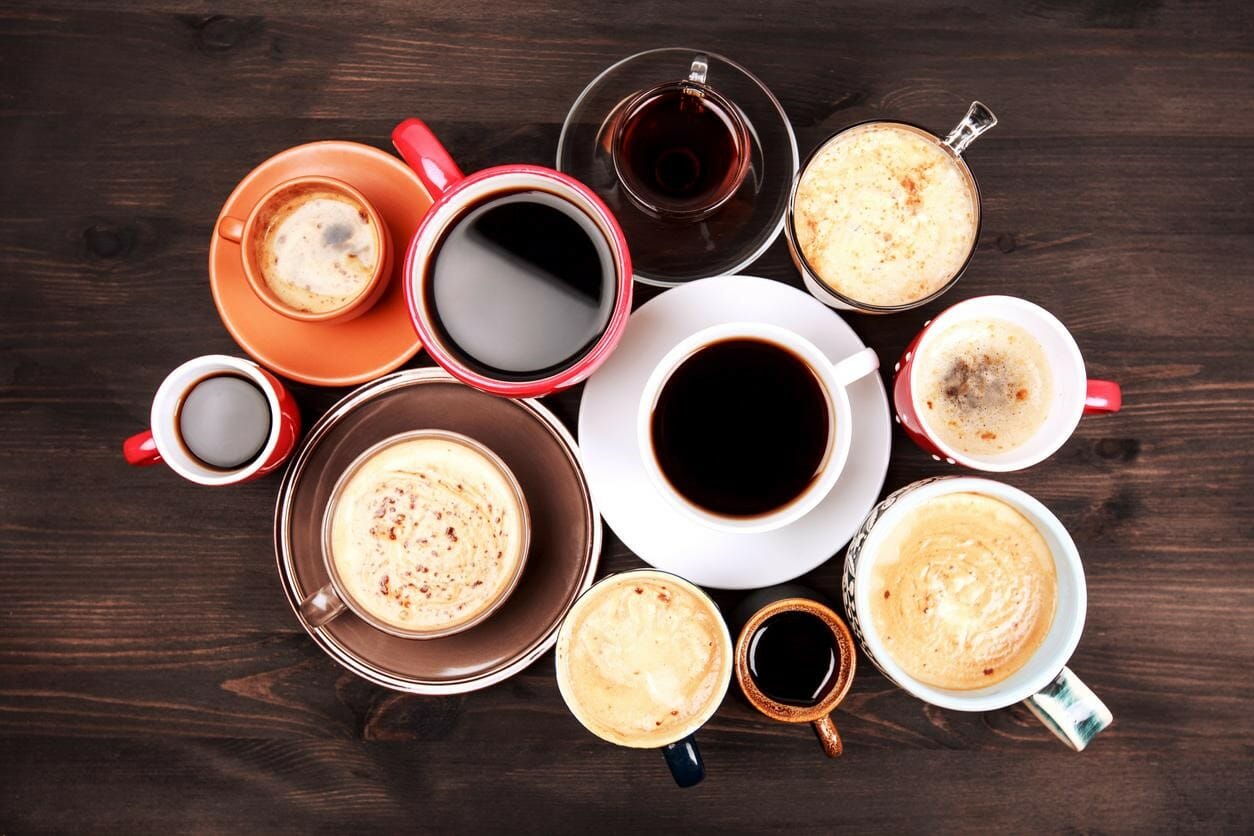
Ever wondered which historical figures or present-day celebrities were most coffee addicted? Find out who the biggest coffee fans of the last 600 years are, from Beethoven to Britney.
Coffee gets a lot of us through the working day. Whether you have a single cup in the morning or drink it to constantly fuel your next move, regular consumption of caffeine can provoke a mild dependence.
Habitual coffee drinking is no new thing, though. Ever since its discovery, coffee has been enjoyed because of its addictive, caffeine-rich properties. Originally discovered in the Middle East, coffee was brought to Europe by Venetian merchants in 1615 from Istanbul.
By 1660, London had hundreds of coffee houses that had quickly become integral to the city’s social scene. Men from every social class could pay one penny to gain entry, and then take part in intellectual conversation once inside. Since then, coffee culture has been globalised, and North American and Australian coffee culture have merged with the culture in Europe.
In the UK, 95 million cups of coffee are consumed per day, the coffee industry creates over 210,000 jobs, and 80% of people who visit coffee shops do so at least once a week, say the British Coffee Association.
But how has coffee culture changed over time, and who are the people with some of the most well-documented coffee addictions? rijo42 has collated a list of 10 of the most iconic coffee-dependent figures from the 16th century to the modern day.
Pope Clement VIII, 1536-1605 – Pope
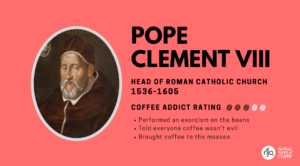
Before Pope Clement VIII had his way, coffee was widely regarded as being an evil drink – something that was associated with the devil because of its origins in Islamic countries. Before publicly denouncing it, the Pope decided to try the evil drink, announcing that it was delicious and that ‘we should cheat the devil by baptising it!’
Because of scant records from that time, it’s hard to know whether he actually baptised the coffee or performed an exorcism, but what we do know is that Pope Clement can be credited with coffee quickly gaining popularity all across Europe.
Samuel Pepys, 1633-1703 – Diarist
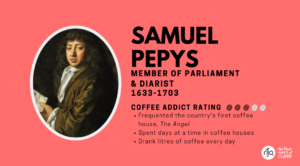
Samuel Pepys was a well-known Member of Parliament and Admiral who is known centuries later because of his diaries, which are now one of the most important historical sources of his era.
At the time, safe drinking water was in short supply and most people would have drank watered-down beer to stay hydrated. Coffee provided a delicious alternative but soon women became frustrated with their husbands spending so much time away from home in the coffee shops.
It was in this context that Samuel Pepys would visit his local coffee house ‘The Angel’ in Oxford to take part in conversations about politics, religion, and literature, documenting his days spent in the coffee houses in his diary.
Though the drink was weak by today’s standards (directions for how to make coffee at the time specified using “the third part of a spoonful for each person”), Pepys drank gallons of it habitually.
Johann Christian Bach, 1685-1750 – Composer
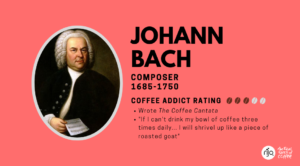
Coffee was very much a part of European society when Johann Bach was a young man. As a composer of Baroque music, Bach looked to expand the complexity of musical performance and range. But it is one of Bach’s musical pieces in particular that acts as a great source on how coffee impacted society. The Coffee Cantata is a moral treatise on the role of coffee in society.
The cantata was about a coffee-addicted young woman and her father. The father demands that she must lose her coffee habit and marry, but the daughter asks if she can marry another coffee addict so that she doesn’t have to give the drink up. One of the lines translates to “If I can’t drink my bowl of coffee three times daily, then in my torment I will shrivel up like a piece of roasted goat.”
Voltaire, 1694-1778 – Writer and Philosopher
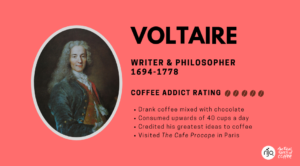
By Voltaire’s time, coffee was regarded to have exceptional health benefits, and he liked to mix his coffee with chocolate, which was a luxury item at the time. Voltaire was well known to consume upwards of 40 cups a day, crediting his great philosophical ideas with the drink.
Voltaire was known to drink in The Café Procope in Paris which was established in 1686 and is still in operation today. It’s largely due to this café that coffee in France became so popular. Before this, it was sold on refreshment stands only – but the coffee house showed that there was demand for a sit in experience.
The Café Procope sat opposite the Comedie-Francaise, drawing a crowd of creatives and intellectuals including Rousseau and Diderot. Later, the coffee house was a central meeting place for activists in the French Revolution.
Marie Antoinette, 1755-1793- The Last Queen of France
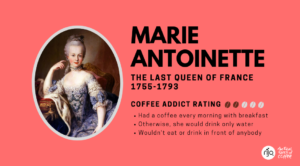
This famously guillotined queen lived life to excess, presiding over a huge estate at Versailles, with a mock hamlet where she could play at being a pauper.
Although her eating habits are generally undocumented, Marie Antoinette’s chambermaid, Madame Campan said, “She usually ate nothing but roast or boiled poultry and drank nothing but water. The only things of which she was particularly fond where her morning coffee and a sort of bread to which she had grown accustomed during her childhood in Vienna”.
Marie Antoinette changed a lot about French court culture at the time, making it a lot less formal. However, the King and Queen had to eat meals in public in front of courtiers and visitors. Sources at the time say that Marie-Antoinette wouldn’t even remove her gloves or unfold her napkin and didn’t touch food in front of others.
Ludwig van Beethoven, 1770-1827 – Composer and Pianist
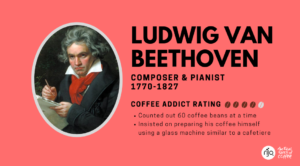
Beethoven learned about musical composition from his father at an early age, but after losing his hearing to typhus as a child, he became obsessive with certain things. After a difficult childhood with abusive parents, he developed an alcohol dependency that ultimately caused his death through liver damage.
Beethoven drank coffee religiously, counting out 60 coffee beans each time and double checking them to be sure. He also always prepared his own coffee using a glass machine – probably similar to a cafetière.
Soren Kierkegaard, 1813-1855 – Philosopher

Kierkegaard is one of the greatest philosophers of all time and is widely credited with forming the existentialist movement – the idea that each individual is a free and responsible agent for their own will. At the time, Kierkegaard’s ideas challenged upheld views on religion, morality, psychology and ethics.
To fuel his late-night study sessions, he was known to fill his cup to the rim with sugar which he would then dissolve with incredibly strong black coffee before knocking the mixture back in one gulp.
Jackie Chan, 1954-present – Martial Artist and Movie Star
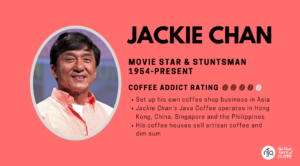
Jackie Chan is known all over the world for starring in action movies where he shows off his incredible martial arts stunts.
Originally from Hong Kong, he would have been introduced to western-style coffee during British colonial rule. Since then, coffee was mainly served alongside western style meals until chains like McDonald’s and Starbucks launched their stores and became popular amongst the younger generations.
Hong Kong is steadily becoming a centre for coffee culture, and Jackie Chan spotted a gap in the market in 2006 when he launched Jackie Chan’s Java Coffee in China, Singapore, Hong Kong and the Philippines. His stores sell coffee and dim sum – a combination that is popular.
Coffee is still seen as a sound investment in Asia, as more and more people begin to open up their own coffee houses or roasteries.
Hugh Jackman, 1968-present – Actor
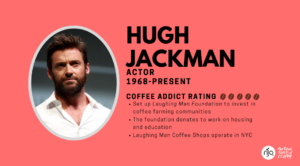
As one of Hollywood’s biggest names, actor Hugh Jackman has starred in films such as Les Miserables, Wolverine and The Greatest Showman. Originally from Australia, a country well known for its artisan coffee scene, he soon wondered how he could bring a slice of that to New York whilst giving back to poorer communities around the world in a sustainable way.
The Laughing Man Foundation invests in coffee farming communities around the world, inspired by a trip to Ethiopia where Jackman met a young farmer called Dukale, and was inspired to change his life for the better.
All the profits from the foundation are donated back into coffee farming communities to work on housing and education through university scholarships. Every pack of coffee is Fairtrade, changing the lives of the people that make up the supply chain.
Britney Spears, 1981-present – Pop Star
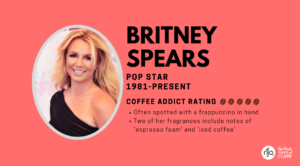
Britney Spears shot to fame in the late nineties when she was just 16 years old, with ‘Baby One More Time’. Her career has been widely documented in the international media but what’s lesser known about her is the perfume empire that she has created from the ground up.
She’s another coffee-lover and is often seen walking around Hollywood with a Frappuccino in hand. That alone wouldn’t be enough to earn her a spot on this list, but the fact that two of her fragrances, Prerogative and Private Show, include notes of ‘espresso foam’ and ‘iced coffee’ is!
